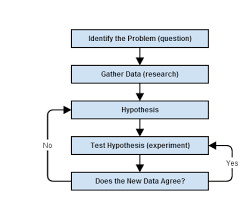The Scientific Method and Its Relevance to Research

The scientific method is a systematic approach to inquiry and investigation that has been the cornerstone of scientific progress for centuries. It provides a structured framework for conducting experiments, making observations, and drawing conclusions based on empirical evidence. This paper explores the fundamental principles of the scientific method and its crucial role in guiding research endeavours across various disciplines.
Historical Development of the Scientific Method
In the annals of history, various approaches to inquiry preceded the scientific method. Aristotle, for instance, relied on deductive reasoning to form conclusions. Alchemy and early proto-scientific processes involved experimentation but needed to have the rigorous approach of the scientific method. The Renaissance era witnessed a resurgence of empirical observation, laying the groundwork for modern science.
The Enlightenment period, nevertheless, witnessed the birth of the modern scientific method. Visionaries like Francis Bacon advocated for inductive reasoning and the importance of empirical data. Rene Descartes emphasised scepticism and critical thinking. These philosophers and thinkers collectively contributed to developing a structured approach to scientific inquiry that combined empirical observation with experimentation.
Components of the Method
Observation and Question Formulation
The scientific method begins with keen observation, a fundamental skill for researchers. Words lead to the formulation of testable research questions, which are critical in guiding the research process. These questions drive the development of hypotheses educated guesses about the outcomes of experiments, and provide a clear direction for research.
Experimentation and Data Collection
Designing controlled experiments is central to the scientific method. Researchers manipulate variables and establish control groups in this stage to isolate specific factors. Careful data collection is essential, employing various techniques and tools to gather empirical evidence. Experiments should be replicable, allowing other researchers to verify findings.
Data Analysis and Interpretation
Statistical methods are crucial in data analysis, helping researchers identify patterns, correlations, and statistical significance. Drawing meaningful conclusions requires a comprehensive understanding of the data and its implications. It is imperative to recognise the limitations and uncertainties inherent in any dataset.
Peer Review and Reproducibility
Peer review plays a pivotal role in validating scientific findings. Independent experts evaluate research for methodological rigour and accuracy. Reproducibility, the ability to replicate research findings, is a cornerstone of scientific integrity. Addressing biases and ensuring objectivity is paramount in maintaining the credibility of research.
The Iterative Nature of the Scientific Method
The scientific method is not a linear process but an iterative one. Hypotheses are refined and modified based on new evidence and experiment insights. The unexpected results often lead to exciting discoveries and paradigm shifts in scientific thinking.
Thomas Kuhn’s concept of paradigm shifts underscores this idea, where revolutionary discoveries can reshape entire fields. For instance, the Copernican Revolution transitioned society from the geocentric to the heliocentric universe model, fundamentally altering our understanding of the cosmos.
The Methods in Different Disciplines
The scientific method is adaptable and applicable across various disciplines.
Natural Sciences
The scientific method’s application is evident in chemistry, biology, and physics. Biologists conduct experiments to understand genetic processes, chemists explore new compounds, and physicists seek to unravel the mysteries of the universe. The scientific method underpins their research, providing structure and rigour.
Social Sciences
Psychology, economics and sociology present unique challenges in applying the scientific method to human behaviour and societal phenomena. While experiments may not always be feasible, researchers in these fields employ observational studies, surveys, and statistical analysis to draw meaningful conclusions. Ethical considerations also play a critical role in ensuring the well-being and privacy of human subjects.
Contemporary Issues and Debates Surrounding the Scientific Method
Replicability Crisis and Quality of Research
In recent years, concerns have arisen regarding the replicability of scientific research. Some studies need to reproduce their findings, casting doubt on their validity. Researchers and institutions actively address this crisis by improving research design, methodology, and statistical practices. Transparency in reporting results is also becoming more critical.
Ethical Considerations and Bias in Research
Ethical considerations are paramount in modern research. Ethical review boards and committees oversee research involving human subjects and animals, ensuring their welfare and rights. Additionally, researchers must be vigilant in identifying and mitigating data collection and interpretation biases. Diversity and inclusivity in research are also emphasised to eliminate systemic biases.
Conclusion
The scientific methods are the bedrock of empirical inquiry, guiding researchers towards reliable and credible results. Its historical development, components, and iterative nature have fueled centuries of scientific progress. It is a versatile tool, equally at home in the natural and social sciences, enabling us to explore the universe and understand human behaviour.
Contemporary challenges, such as the replicability crisis and ethical considerations, underscore the need for ongoing improvement and adaptation in research practices. By embracing the principles of the scientific method and maintaining its integrity, we are poised to address the complex issues of our time and unlock new realms of understanding. The scientific method remains the compass guiding us on our journey of discovery, allowing us to navigate the vast seas of the unknown with precision and confidence.
References:
Khan Academy (2021). The scientific method. [online] Khan Academy. Available at: https://www.khanacademy.org/science/biology/intro-to-biology/science-of-biology/a/the-science-of-biology.
Science Buddies (2012). Steps of the Scientific Method. [online] Science Buddies. Available at: https://www.sciencebuddies.org/science-fair-projects/science-fair/steps-of-the-scientific-method.
Wikiwand. (n.d.). Scientific method. [online] Available at: https://www.wikiwand.com/en/Scientific_method.





